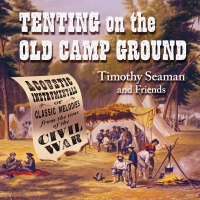|
Album Liner Notes 1. Angelina Baker (Stephen C. Foster, 1850) Foster wrote many songs for young ladies; this is one of the more cheerful type!/Some Folks (Stephen C. Foster, 1855) “Long live the merry, merry folk that laugh by night and day!” This was a highlight of the Robert Shaw Chorale album I loved as a boy./Angeline the Baker (trad. Am.) When our younger daughter was born we sang a parody on the only words of this joyous tune for her: “Laurie Jean the baby!” 3:03 2. Aura Lea (George R. Poulton, 1861) A classic popular tune of a “maid with golden hair.”/Lorena (H.D.L. Webster, 1857) This most favorite song of the Southern soldiers was by the composer of “The Sweet By and By” and was banned in some camps because of its tendency to inspire desertions. 4:20 3. Johnny Has Gone for a Soldier (Shule Aroon) (trad. Ir.) A very old tune sung in many a war by dear ones at home./When Johnny Comes Marching Home (Patrick S. Gilmore, 1863) And Johnny returns --- a joyful, triumphant theme! 2:35 4. Old Folks at Home (Stephen C. Foster, 1851) “Way down upon the Swanee River, far, far away, there’s where my heart is turning ever.”/My Old Kentucky Home, Good Night (Stephen C. Foster, 1853) “The corn-top’s ripe, and the meadow’s in the bloom…” 4:27 5. Ring, Ring the Banjo (Stephen C. Foster, 1851) “On the banjo tapping, I come with dulcem strain…”/Oh! Susanna (Stephen C. Foster, 1848) Foster’s first big hit was adopted as the “anthem” of the California Gold Rush and quickly spread to the whole known world./Kingdom Coming (Year of Jubilo) (Henry C. Work, 1862) Work, an abolitionist, wrote this popular antislavery song, ironically, in the minstrel style; it survives today as a favorite Southern fiddle tune./The Yellow Rose of Texas (trad. Am.)A widely sung soldier song about a sweetheart with whom “we’ll play the banjo gaily and we’ll sing the songs of yore.” 2:47 6. Two Appalachian folk hymns: Nashville (trad. Am.) Jeremiah Ingalls’s 1800 words: “The Lord into his garden come; the spices yield their rich perfume, the lilies grow and thrive; refreshing showers of grace divine from Jesus flow to every vine and make the dead revive.”/Soldier’s Return (trad. Scot.) “There is no name so sweet on earth.”/ and The Solid Rock (William B. Bradbury, 1863) “My hope is built on nothing less than Jesus’ blood and righteousness.” 4:22 7. Marching Along (William B. Bradbury, 1862) The North’s euphoria at the preparation for the conflict: “McClellan’s our leader: He’s gallant and strong…”/Goober Peas (A.E. Blackmar, 1865) …and the South’s bitter starving fate late in the conflict presented with satirical good humor: “Goodness how delicious!” 1:45 8. Sweet Hour of Prayer (William B. Bradbury, 1859) “that leads me from a world of care and bids me at my Father’s throne make all my wants and wishes known.”/He Leadeth Me (William B. Bradbury, 1864) “O blessed thought! O words with heavenly comfort fraught!” 3:50 9. Wade in the Water (trad. Am.) One of the many African-American spirituals that have three levels of meaning: 1) the literal Biblical reference (crossing the Jordan River); 2) the spiritual applications (crossing through death to Heaven or through trials to righteous victory); 3) the slave’s hope in earthly life (crossing the American river to freedom). 2:26 10. Near the Cross (William H. Doane, 1869) “There a precious fountain, free to all --- a healing stream --- flows from Calvary’s mountain.” 2:08 11. Just Before the Battle, Mother (George F. Root, 1862) A dearly loved sentimental tune sung by both sides: “I am thinking most of you, while upon the field we’re watching, with the enemy in view.”/Weeping, Sad and Lonely (Henry Tucker, 1862) Both North and South widely sang Charles C. Sawyer’s words “When this cruel war is over, praying that we meet again!”/The Vacant Chair (George F. Root, 1862) Another of the most extensively sung songs of the war, written at Thanksgiving 1861: “We shall meet, but we shall miss him.” 4:18 12. Sculley’s Reel (trad. Ir.)/Tramp! Tramp! Tramp! (The Prisoner’s Hope) (George F. Root, 1864) The words depict the plight of a soldier whose unit was swept aside and captured by an enemy that would ultimately lose the battle; he can hear in the distance the footsteps of his liberating comrades: “Cheer up, brothers, they will come!” 3:56 13. I Hear Those Gentle Voices Calling (Old Black Joe) (Stephen C. Foster, 1860) Written when Foster’s family was almost all gone and he was leaving town for good, this nobly wistful tune cries for reunion: “I’m coming, I’m coming, for my head is bending low…” 3:43 14. Beautiful Dreamer (Stephen C. Foster, 1864) One of Foster’s most wonderful songs was one of his last, a longing vision of love’s hope. “Starlight and dewdrops are waiting for thee; sounds of the rude world heard in the day, lulled by the moonlight have all passed away!” 3:34 15. Nelly Bly (Stephen C. Foster, 1850) “Listen, love, to me, I’ll sing for you, play for you a dulcem melody!” The famous nineteenth-century reporter took her pseudonym from this song. 3:12 16. All Quiet Along the Potomac (John H. Hewitt, 1863) A melody for a popular poem for the unknown dead of the war: a sentry is picked off by a sniper and his body is never found in the woods./Somebody’s Darling (John H. Hewitt, 1864) A Southern song that became popular in the North: “…so young and so brave, wearing still on his sweet but pale face, soon to be hid in the dust of the grave the lingering light of his boyhood’s grace.” 4:03 17. Gentle Lena Clare (Stephen C. Foster, 1862) An anthem to a loved one: “I love her careless winning ways, I love her wild and birdlike ways…”/Gentle Annie (Stephen C. Foster, 1856) A beautiful true lament upon the death of a young girl. “My heart bows down when I wander by the streams and the meadows where we strayed.” 3:48 18. Motherless Child (trad. Am.) The cry of the heart of the oppressed “a long way from home.” Many of the slaves were indeed motherless children./Nobody Knows the Trouble I See (trad. Am.) “…nobody knows but Jesus.”/Go Down, Moses (trad. Am.) The Abolitionists, and Abraham Lincoln in particular, were seen as a modern-day Moses demanding the release of an enslaved people. In honor of James Robeson’s magnificent rendition in the 1930s./He’s Got the Whole World in His Hands (trad. Am.) The transcendent hope in Divine sovereignty. 6:51 19. Dixie (Daniel D. Emmett, 1860) Emmett, a New Yorker, longed for the warm days he remembered from his time in the South, and wrote a song about it. The Southerners adopted it as their anthem. Emmett said, “If I had known it was going to be so popular, I would have written it better.” Here, Ouida interprets the complexity of emotions and events of that time of war. 2:35 20. Tenting on the Old Camp Ground (Walter Kittredge, 1864) Late in the war some soldiers had the experience of camping where earlier battles had been fought: Manassas, Chancellorsville, Cold Harbor, “wishing for the war to cease.” 2:29 21. One report tells of a time that troops from the two sides were encamped on either side of the Potomac and could hear each other’s patriotic singing: first a Southern favorite such as The Bonnie Blue Flag (trad. Ir., present form 1861) and a response of a Union favorite such as The Battle Cry of Freedom (George F. Root, 1862) --- and then the two sides joined in a unified rendition of Home! Sweet Home! (Henry R. Bishop, 1823) (Actually, this most popular song of the 19th Century was seen by commanding officers as so detrimental to the fighting morale of the troops that it was often banned in the camps.) 3:20 22. Taps (Daniel A. Butterfield, 1862) Near our home, at Harrison’s Landing at Berkeley Plantation, a Brigadier General reworked the old Scottish Tattoo for a final bugle call after a burial service at the end of the Seven Days near Richmond early in the war. When I was a boy at Scout campouts we sang the words “Day is done; gone the sun from the lake, from the hills, from the sky; all is well: safely rest. God is nigh.” 1:21 |
| MAIN | SONG LIST | LINER NOTES | BUY MUSIC |




 Tenting on the Old Camp Ground (2012)
Tenting on the Old Camp Ground (2012)